December 5, 2014 •
Illinois House Adjourns Sine Die
The Illinois House of Representatives adjourned its two-year legislative session sine die on Wednesday, December 3. Some state business will be left until Republican Gov.-elect Bruce Rauner and a new General Assembly take office in January. It is possible, however, […]
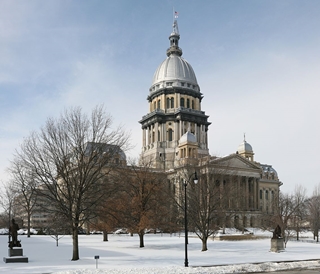 The Illinois House of Representatives adjourned its two-year legislative session sine die on Wednesday, December 3.
The Illinois House of Representatives adjourned its two-year legislative session sine die on Wednesday, December 3.
Some state business will be left until Republican Gov.-elect Bruce Rauner and a new General Assembly take office in January. It is possible, however, for outgoing Gov. Pat Quinn to call a special session to force a vote on legislation increasing the minimum wage before he leaves office.
The Senate did not formally adjourn and will sit in session on January 13.
Photo of the Illinois Capitol Building by Daniel Schwen on Wikimedia Commons.
October 15, 2014 •
Contribution Limits Lifted in Chicago Mayoral Race
The campaign contribution limits have been lifted for candidates in the Chicago mayoral race. Under state law, the limits are lifted for all candidates in a local race once a candidate in said race exceeds $100,000 in contributions to his […]
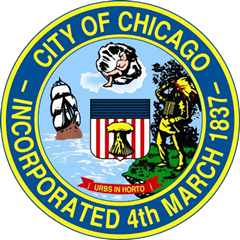 The campaign contribution limits have been lifted for candidates in the Chicago mayoral race. Under state law, the limits are lifted for all candidates in a local race once a candidate in said race exceeds $100,000 in contributions to his own campaign within a year of the election.
The campaign contribution limits have been lifted for candidates in the Chicago mayoral race. Under state law, the limits are lifted for all candidates in a local race once a candidate in said race exceeds $100,000 in contributions to his own campaign within a year of the election.
Conservative candidate William J. Kelly reached the $100,000 threshold on Monday. This is seemingly good news for Rahm Emanuel, who will now be able to go back to wealthy supporters to add to his campaign war chest.
Kelly argues lifting the caps does not help his opponent, however, as Emanuel already has all the money he needs. Kelly contends the playing field has been leveled as anti-Emanuel groups are now free to contribute to him as much as they want.
September 11, 2014 •
Cook County Board Bans Lobbyist Activity During Public Meetings
The Cook County Board of Commissioners passed a new ordinance banning registered lobbyists from attempting to communicate with commissioners, for purposes of discussing any matter of county business, while the commissioners are present on the floor during public meetings. The […]
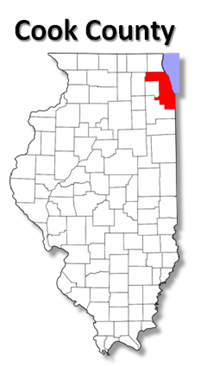 The Cook County Board of Commissioners passed a new ordinance banning registered lobbyists from attempting to communicate with commissioners, for purposes of discussing any matter of county business, while the commissioners are present on the floor during public meetings.
The Cook County Board of Commissioners passed a new ordinance banning registered lobbyists from attempting to communicate with commissioners, for purposes of discussing any matter of county business, while the commissioners are present on the floor during public meetings.
The ordinance does not affect lobbying outside of county chambers or lobbying in the boardroom after a meeting is brought to a close.
Moreover, the new rule applies only to registered lobbyists, and makes no mention of those engaged in lobbying activity who are not yet registered with the county.
August 20, 2014 •
Chicago Board of Ethics Submits Revised Rules to Council
The Board of Ethics formally submitted its revised Rules & Regulations to the City Council on August 19. The rules govern board activities in conformation with the provisions of the Governmental Ethics Ordinance. Unless the City Council, by majority vote, […]
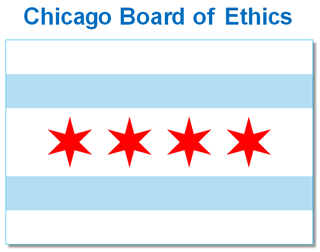 The Board of Ethics formally submitted its revised Rules & Regulations to the City Council on August 19. The rules govern board activities in conformation with the provisions of the Governmental Ethics Ordinance.
The Board of Ethics formally submitted its revised Rules & Regulations to the City Council on August 19. The rules govern board activities in conformation with the provisions of the Governmental Ethics Ordinance.
Unless the City Council, by majority vote, votes to disapprove them, the rules will become effective 45 days after submission.
July 1, 2014 •
Illinois Legislative Inspector General Steps Down
Tom Homer stepped down from his post as legislative inspector general at the end of June. Homer, an advocate for modern ethics reform, took the job in 2004 and served as the state’s first and only legislative watchdog. It is […]
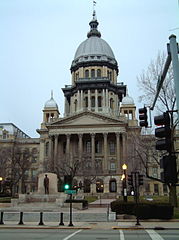 Tom Homer stepped down from his post as legislative inspector general at the end of June. Homer, an advocate for modern ethics reform, took the job in 2004 and served as the state’s first and only legislative watchdog.
Tom Homer stepped down from his post as legislative inspector general at the end of June. Homer, an advocate for modern ethics reform, took the job in 2004 and served as the state’s first and only legislative watchdog.
It is unclear who will replace him; the inspector general is appointed by a resolution approved by three-fifths majorities in both houses of the General Assembly.
Photo of Illinois State Capitol by Martin Haase on Wikimedia Commons.
April 15, 2014 •
Chicago Board of Ethics Issues Revised Informational Bulletins
The City of Chicago Board of Ethics recently released new ethics bulletins. Two revised brochures provide up-to-date guides for the public as well as for city employees and elected officials. Both include new provisions covering whistleblower protection and the duty […]

The City of Chicago Board of Ethics recently released new ethics bulletins. Two revised brochures provide up-to-date guides for the public as well as for city employees and elected officials. Both include new provisions covering whistleblower protection and the duty of officials, employees, and city contractors to report corrupt or unlawful activity.
A third brochure is also available pertaining to outside employment for city employees.
All new or revised bulletins are available for public viewing on the Ethics Department website.
March 28, 2014 •
Performance of Ordinary Job Responsibilities Leads to Reverse Revolving Door Violation for Chicago Employee
On March 21, the Chicago Board of Ethics posted a summary of its reverse revolving door ruling on the city’s website. The ruling comes from a case brought before the board for the purpose of reviewing the conduct of a […]
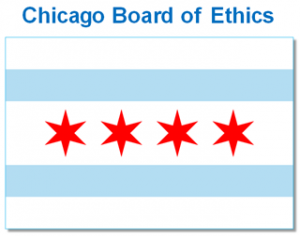
On March 21, the Chicago Board of Ethics posted a summary of its reverse revolving door ruling on the city’s website. The ruling comes from a case brought before the board for the purpose of reviewing the conduct of a department director.
Chicago’s reverse revolving door ordinance prohibits employees or officials from personally participating in a decision-making capacity as to their immediate pre-city employers or clients for a period of two years after joining the city.
The board ruled an employee involved in a procurement process for the city violated the reverse revolving door provision even though he consistently avoided extraneous contact with personnel from his pre-city employer and from its umbrella organization. Simply scoring RFP responses in addition to training or meeting with employees from a pre-city employer or affiliate in the ordinary course of employment constitutes a minor violation.
March 11, 2014 •
U.S. District Court Addresses Illinois Campaign Finance Law
Contributions limits will likely remain in place for the entire 2014 election cycle as Illinois Liberty PAC v. Madigan carries on. In July 2012, the Liberty Justice Center filed suit against Attorney General Lisa Madigan, challenging the Illinois Disclosure and […]

Contributions limits will likely remain in place for the entire 2014 election cycle as Illinois Liberty PAC v. Madigan carries on. In July 2012, the Liberty Justice Center filed suit against Attorney General Lisa Madigan, challenging the Illinois Disclosure and Regulation of Campaign Contributions and Expenditures Act on constitutional grounds.
Specifically, Plaintiffs claim the Act violates the First Amendment and the Equal Protection Clause by exempting political parties from the contribution limits applicable to PACs and individuals, by lifting contribution limits in races where a self-funding candidate or independent expenditure committee spends more than a particular threshold, and by imposing lower contribution limits on PACs than are imposed on corporations, labor unions, and other organizations.
The complaint also challenges the Act’s constitutionality because it classifies legislative caucus committees as political party committees and thereby treats them more favorable than PACs, corporations, and individuals, without valid reasoning.
On March 3, U.S. District Judge Gary Feinerman denied Defendant’s motion to dismiss with respect to the treatment of legislative caucus committees but granted the motion with respect to all other challenges.
Although the court suspects legislative caucus committees are sufficiently similar to political party committees for purposes of constitutional analysis, the case remains open to give both sides a fair opportunity to address the issue.
February 25, 2014 •
Chicago City Council Approves Contractor Corrupt Activity Ordinance
The Chicago City Council approved an ordinance introduced by Mayor Emanuel requiring every city contractor to report corrupt activity. The ordinance requires city contractors to notify the city’s inspector general of bribery, theft, forgery, perjury, and fraud they are aware […]

The Chicago City Council approved an ordinance introduced by Mayor Emanuel requiring every city contractor to report corrupt activity.
The ordinance requires city contractors to notify the city’s inspector general of bribery, theft, forgery, perjury, and fraud they are aware were committed against the city. Knowingly failing to report such activity is a violation of the ordinance.
The ordinance becomes effective on March 5, 2014.
January 2, 2014 •
Chicago Board of Ethics Posts New Informational Brochures
The Chicago Board of Ethics recently posted two new publications on its website, both of which outline ethics restrictions for city officials. The first addresses, among other things, general conflicts of interest, lobbying on behalf of others, financial interests in […]
 The Chicago Board of Ethics recently posted two new publications on its website, both of which outline ethics restrictions for city officials.
The Chicago Board of Ethics recently posted two new publications on its website, both of which outline ethics restrictions for city officials.
The first addresses, among other things, general conflicts of interest, lobbying on behalf of others, financial interests in city contracts, financial disclosure requirements, gifts, revolving door provisions, and penalties for ethics violations.
The second addition is a publication delineating what city employees and officials may or may not do in terms of contracting with the city.
Both documents are intended to provide a basic understanding of ethics rules and are not deemed legal advice.
November 14, 2013 •
Illinois Gubernatorial Campaign Contribution Limits Lifted
Gubernatorial candidate Bruce Rauner recently put $500,000 of his own money into his campaign, effectively lifting contribution limits for all candidates in the race. Under state law, candidates may accept no more than $5,300 from individuals and $52,600 from PACs. […]
 Gubernatorial candidate Bruce Rauner recently put $500,000 of his own money into his campaign, effectively lifting contribution limits for all candidates in the race. Under state law, candidates may accept no more than $5,300 from individuals and $52,600 from PACs. However, those caps do not apply if any statewide candidate or member of the candidate’s immediate family contributes or loans more than $250,000 to his or her campaign during the 12 months leading up to an election.
Gubernatorial candidate Bruce Rauner recently put $500,000 of his own money into his campaign, effectively lifting contribution limits for all candidates in the race. Under state law, candidates may accept no more than $5,300 from individuals and $52,600 from PACs. However, those caps do not apply if any statewide candidate or member of the candidate’s immediate family contributes or loans more than $250,000 to his or her campaign during the 12 months leading up to an election.
Rauner previously donated $249,000 to his campaign, thereby avoiding the threshold. By waiting until now to lift the cap he successfully undermined the ability of his competitors to bring in big-money donors. Rauner’s latest actions allow all three Republican candidates, as well as the Democratic candidate, to accept contributions of any size.
August 29, 2013 •
DuPage County Eliminates Pay-to-Play Restrictions
Laws were found to be unenforceable
 The DuPage County Board repealed its pay-to-play provisions after learning from the state’s attorney’s office the provisions were unenforceable. As a non-home rule county, the county did not have the power to act on limiting campaign contributions because it was not specifically granted that power by the state legislature.
The DuPage County Board repealed its pay-to-play provisions after learning from the state’s attorney’s office the provisions were unenforceable. As a non-home rule county, the county did not have the power to act on limiting campaign contributions because it was not specifically granted that power by the state legislature.
The changes were enacted as part of an otherwise minor update to the county’s ethics code. Provisions requiring disclosure of campaign contributions by contractors remain in place.
April 9, 2013 •
Chicago Voters to Choose Jesse Jackson Jr.’s Replacement
Former Chicago Bear also running for Romeoville mayor
 Voters in the Chicago area are heading to the polls this morning to choose a new representative to the United States Congress, as well as other local offices. Voters on the south side of the city must pick a successor to former Representative Jesse Jackson Jr. Jackson resigned from Congress earlier this year for personal reasons and has since pleaded guilty to illegally using campaign funds for personal expenses.
Voters in the Chicago area are heading to the polls this morning to choose a new representative to the United States Congress, as well as other local offices. Voters on the south side of the city must pick a successor to former Representative Jesse Jackson Jr. Jackson resigned from Congress earlier this year for personal reasons and has since pleaded guilty to illegally using campaign funds for personal expenses.
The Democratic nominee, Robin Kelly, is the favorite in the heavily Democratic district. Kelly is a former state lawmaker who hails from Matteson, a village in the south suburbs.
Her opponent is the Republican nominee, Paul McKinley. McKinley, who served almost 20 years in prison for armed robbery, burglary, and aggravated battery, is running on a promise to stop the Chicago political machine and put ex-offenders back to work to help turn their lives around.
In another high profile race, former Chicago Bears defensive lineman Steve McMichael will take on incumbent John Noak for Romeoville mayor. Romeoville is about 30 miles southwest of Chicago and has a population of almost 40,000.
Towns throughout the area will also be deciding whether to allow video poker machines and whether to approve multiple bond requests. Polls close at 7 p.m. local time and the weather looks promising for a good turnout.
March 7, 2013 •
Two Bills Could Change Illinois Lobbying Laws
Representative Drury proposes changes to registration and gift laws
 State Representative Scott Drury has recently introduced two bills that would change the way lobbyists operate within the state. House Bill 2957 would change the definition of lobbying, thus causing more people to register as a lobbyist.
State Representative Scott Drury has recently introduced two bills that would change the way lobbyists operate within the state. House Bill 2957 would change the definition of lobbying, thus causing more people to register as a lobbyist.
The bill would add communicating with a local government to influence action to the definition of lobbying. Therefore, all people who lobby a local government without a lobbying ordinance, the cities of Rockford and Springfield for example, would have to register as a lobbyist with the state. Also, those who lobby in a city with a lobbying ordinance, such as Chicago, would have to register with the state, in addition to their current city registration.
House Bill 2964 is a bill aimed at the state’s current prohibition on gifts. It would prohibit the relatives of a state officer, legislator, or employee from receiving prohibited gifts from a prohibited source (under state law, a lobbyist is considered a prohibited source). The bill also adds a new exception to the ban, adjusts one of the current exceptions, and abolishes another of the exceptions.
If the bill passes, a state officer, legislator, or employee would be allowed to accept admission to and the cost of food and beverages consumed at a reception, meal, or meeting by an organization before whom the recipient appears to speak or answer questions as part of a scheduled program where all members of the General Assembly were invited. This would replace the current exception for food and beverage, which allows for those to be provided if catered or consumed on the premises.
The bill would also limit the amount of travel expenses provided to $111 per day and the travel must be on a carrier available to the general public.
It remains to be seen whether either one of the bills will pass, but should they pass in their current form, it will change how lobbyists do business in the state.
Photo of the Illinois State Capitol by Daniel Schwen on Wikipedia.
State and Federal Communications, Inc. provides research and consulting services for government relations professionals on lobbying laws, procurement lobbying laws, political contribution laws in the United States and Canada. Learn more by visiting stateandfed.com.


